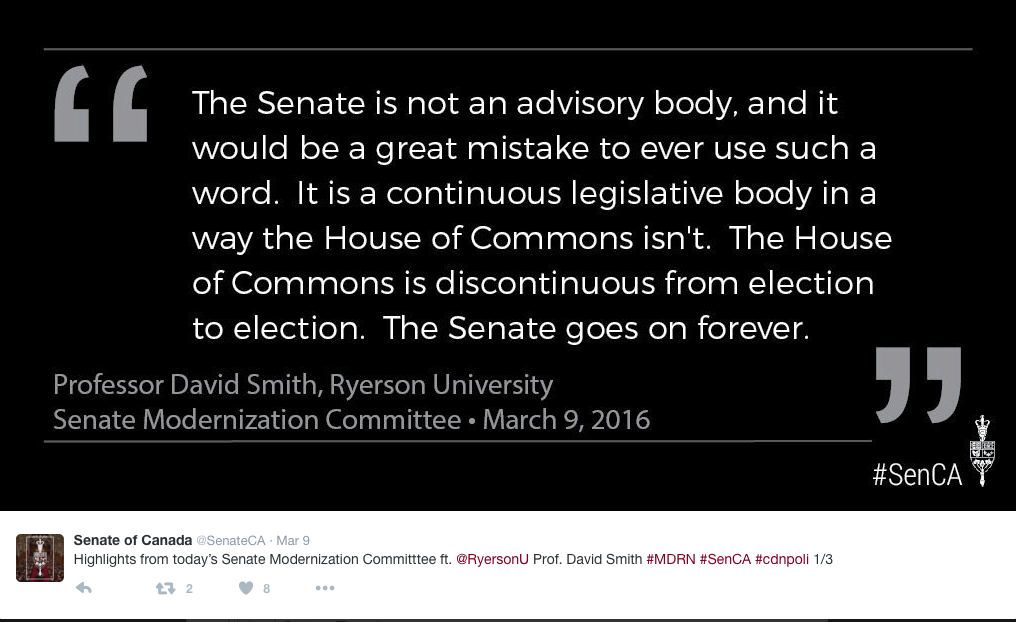Senate Key Check on House, Government, says Professor

The Senate of Canada is a continuous legislative body that exists to challenge the House of Commons and the government, a veteran political scientist told a Senate committee Wednesday.
David Smith, a Ryerson University academic and professor emeritus at the University of Saskatchewan, appeared before members of the Special Senate Committee on Senate Modernization to delve into the history and purpose of the Red Chamber.
“[The Senate] is a continuous legislative body in a way the House of Commons isn’t,” Smith said. “The House of Commons is discontinuous from election to election. The Senate goes on forever.”
Smith summarized the role of the Senate in a single word.
“Very rarely and with great controversy, what it can do and maybe should do is challenge the government,” Smith said. “That, it seems to me, is the role of the second chamber: Challenging.”
He argued the 2014 Supreme Court reference was a watershed moment.
“You’re responsible,” Smith told the committee members. “It's not for the Senate to defeat a government because you're not accountable, but equally, because you're not accountable you can raise all kinds of issues and make the government justify what it’s doing.
“There are issues that Members of Parliament, because of partisan loyalties, feel uncomfortable dealing with or don't understand, but Senators are here for a long period of time. They acquire expertise and knowledge in a way that Members of Parliament are less apt to do."
“[MPs] are also concerned about re election, as many of you would know.”
He cited a poll that suggested the characteristics of the Senate are better aligned with public thought than those of the House.
“The public aren’t that interested in constituency matters,” Smith said. “The world is bigger than a constituency. The world involves all kinds of questions about aging people, sick people, languages, religion, and assisted suicide. These are not constituency questions — these are Canadian questions.”
The Special Senate Committee on Senate Modernization is examining methods to make the Senate more transparent and responsible within the current constitutional framework.
Related articles
Tags
Committee news
Senate Key Check on House, Government, says Professor

The Senate of Canada is a continuous legislative body that exists to challenge the House of Commons and the government, a veteran political scientist told a Senate committee Wednesday.
David Smith, a Ryerson University academic and professor emeritus at the University of Saskatchewan, appeared before members of the Special Senate Committee on Senate Modernization to delve into the history and purpose of the Red Chamber.
“[The Senate] is a continuous legislative body in a way the House of Commons isn’t,” Smith said. “The House of Commons is discontinuous from election to election. The Senate goes on forever.”
Smith summarized the role of the Senate in a single word.
“Very rarely and with great controversy, what it can do and maybe should do is challenge the government,” Smith said. “That, it seems to me, is the role of the second chamber: Challenging.”
He argued the 2014 Supreme Court reference was a watershed moment.
“You’re responsible,” Smith told the committee members. “It's not for the Senate to defeat a government because you're not accountable, but equally, because you're not accountable you can raise all kinds of issues and make the government justify what it’s doing.
“There are issues that Members of Parliament, because of partisan loyalties, feel uncomfortable dealing with or don't understand, but Senators are here for a long period of time. They acquire expertise and knowledge in a way that Members of Parliament are less apt to do."
“[MPs] are also concerned about re election, as many of you would know.”
He cited a poll that suggested the characteristics of the Senate are better aligned with public thought than those of the House.
“The public aren’t that interested in constituency matters,” Smith said. “The world is bigger than a constituency. The world involves all kinds of questions about aging people, sick people, languages, religion, and assisted suicide. These are not constituency questions — these are Canadian questions.”
The Special Senate Committee on Senate Modernization is examining methods to make the Senate more transparent and responsible within the current constitutional framework.





